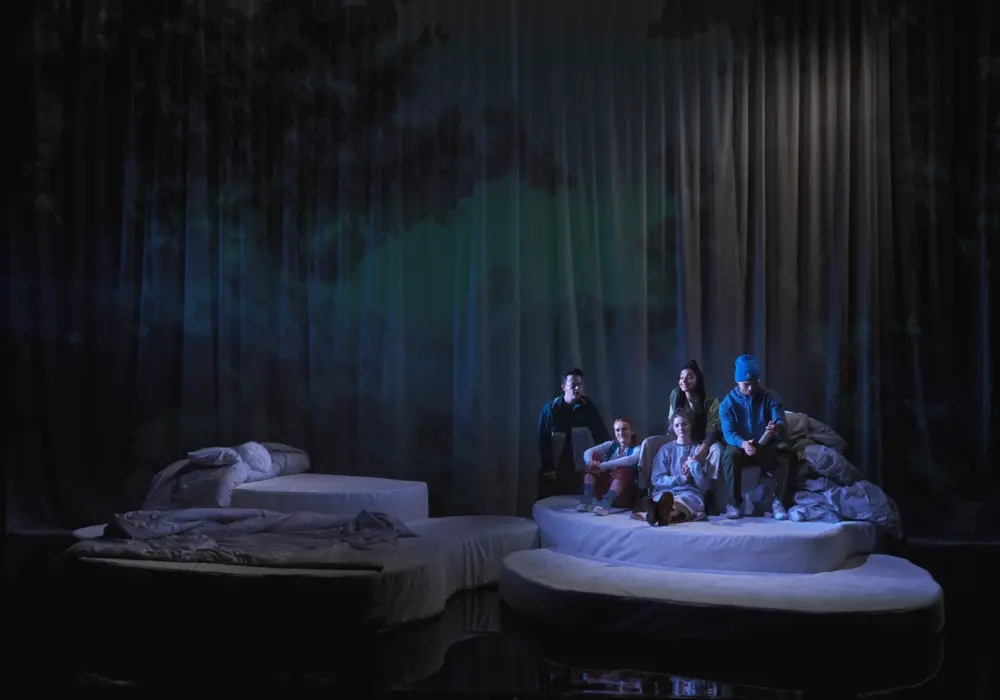Skip to: Oh What a Lovely War, The 39 Steps, A Song for Ella Grey, Limelight, Behold Ye Ramblers, Jarman, Thresholds, The Importance of Being … Earnest?, Morgan and West, The Mystery of Dracula, Dune the Musical, Disco Pigs, Modern Times
January is mostly a quiet month for theatre, but with February almost upon is it’s time to have a look at what’s coming up. Might be worth a reminder at this point that this is not a comprehensive guide to the best things coming up in the north east – much of this is steered by what I’ve seen before, and that largely comes down to luck. If you want to see the full rules, you can check out my Recommendations policy.
Before we begin, one small but notable absence from this list is a production from Live Theatre. For some reason, they’re not doing a mainstream production until May. I’m not sure what decide how many productions an NPO Theatre can support in a year, but what’s unusual is choosing May over March. The conventional wisdom is that you wind down theatre in the summer months, as business drops and more attention goes to the fringe season, and put your big productions in the colder months where you get more sales. Live Theatre, however, seems to think otherwise. Make of that what you will.
But apart from that curiosity, here’s what’s caught my eye.
Safe choice:
The top category. Nothing in my list is recommended for everyone – even the best play in the world appeals to a target audience. But if this sounds like your sort of thing, I’m confident you’ll enjoy this.Most are plays I’ve seen before, all of them have wide appeal. We have:
 I don’t normally send a play straight to Safe Choice without me having seen it before, but Blackeyed Theatre gets a bye to the top spot because the standard of their back catalogue is excellent. Previous hits have included Dracula and Frankenstein with all sound done acoustic and on-stage, a series of adaptation by Nick Lane including the outstanding Jekyll and Hyde writing in a new female character (and making it look like she was part of the story all along), and straightforward productions of classic scripts including their touring version of Teechers not far behind those from John Godber himself. The writers and directors vary, but the one thing that ties these all together is Victoria Spearing, whose set designs over most of the plays gives Blackeyed Productions their own stamp.
I don’t normally send a play straight to Safe Choice without me having seen it before, but Blackeyed Theatre gets a bye to the top spot because the standard of their back catalogue is excellent. Previous hits have included Dracula and Frankenstein with all sound done acoustic and on-stage, a series of adaptation by Nick Lane including the outstanding Jekyll and Hyde writing in a new female character (and making it look like she was part of the story all along), and straightforward productions of classic scripts including their touring version of Teechers not far behind those from John Godber himself. The writers and directors vary, but the one thing that ties these all together is Victoria Spearing, whose set designs over most of the plays gives Blackeyed Productions their own stamp.
This musical is set at the time of World War One – and in case you haven’t already guessed, the title is being sarcastic. No wars are particularly reputed for loveliness, but the war particularly so. However, unlike most World War One plays going straight into a trenches-based gloomfest, this is set in a music hall with a cast in Pierrot costimes. Such a concept would normally put this straight in the Bold Choice list, but with this musical having endured for decades combined with Blackeyed’s flawless track record it’s much more of a safe bet. It tours nationally, with the local stops being the Stephen Joseph Theatre on the 6th – 9th March, Leeds Playhouse on the 26th & 27th March and – most notably – Darlington Hippodrome on the 28th & 30th March. Big milestone for Blackeyed Theatre to have taken to one of the biggest theatres in the region.
Continue reading →

 I don’t normally send a play straight to Safe Choice without me having seen it before, but Blackeyed Theatre gets a bye to the top spot because the standard of their back catalogue is excellent. Previous hits have included Dracula and Frankenstein with all sound done acoustic and on-stage, a series of adaptation by Nick Lane including the outstanding Jekyll and Hyde writing in a new female character (and making it look like she was part of the story all along), and straightforward productions of classic scripts including their touring version of Teechers not far behind those from John Godber himself. The writers and directors vary, but the one thing that ties these all together is Victoria Spearing, whose set designs over most of the plays gives Blackeyed Productions their own stamp.
I don’t normally send a play straight to Safe Choice without me having seen it before, but Blackeyed Theatre gets a bye to the top spot because the standard of their back catalogue is excellent. Previous hits have included Dracula and Frankenstein with all sound done acoustic and on-stage, a series of adaptation by Nick Lane including the outstanding Jekyll and Hyde writing in a new female character (and making it look like she was part of the story all along), and straightforward productions of classic scripts including their touring version of Teechers not far behind those from John Godber himself. The writers and directors vary, but the one thing that ties these all together is Victoria Spearing, whose set designs over most of the plays gives Blackeyed Productions their own stamp.






